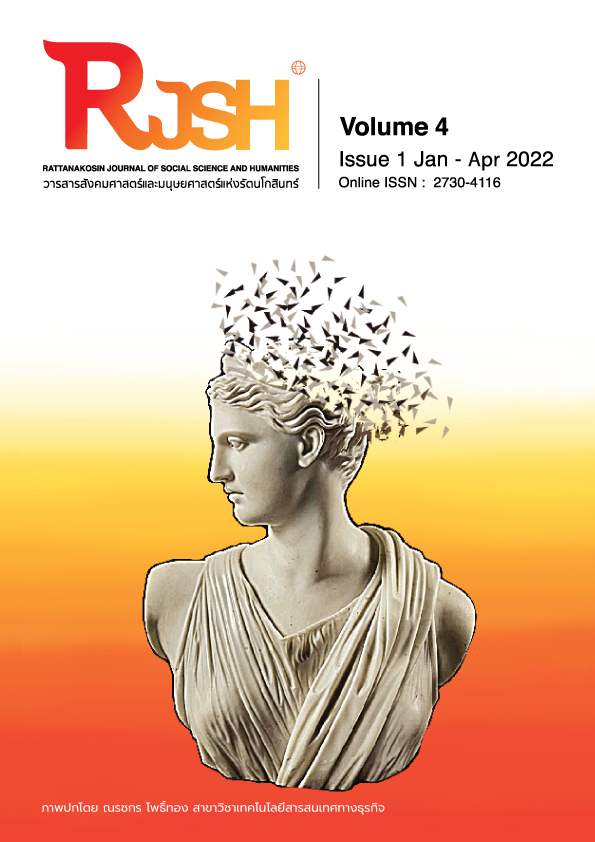Stress and Emotional Quotient of Students in Rajamangala University of Technology Rattanakosin
Main Article Content
Abstract
The main objective of this study was to analyze the relationship between stress and the emotional quotient of students in three main subject groups of Rajamangala University of Technology Rattanakosin. The process began with the selection of a sample group from 360 students in three main subject groups, namely social sciences, technology, and design. The instruments of this study were questionnaires composed of 1) stress test and 2) emotional intelligence screening test. The collected data were analyzed by using descriptive statistics and Pearson’s product-moment correlation. The research results showed that 1) Most of the students had mild stress. The group of technology students had the least stress compared to the other two subject groups. 2) Most of the students had normal emotional intelligence. The technology student group showed the highest levels of emotional intelligence. The design student’s group had the largest number of lower levels of emotional intelligence compared to the other two subject groups. 3) Stress was negatively correlated with all dimensions of emotional quotient. The increase in stress had the greatest impact on the emotional quotient in a good dimension of the social sciences student group. Moreover, stress had the least impact on the emotional quotient in a smart and happy dimension of the design student group.
Article Details
The content within the published articles, including images and tables, is copyrighted by Rajamangala University of Technology Rattanakosin. Any use of the article's content, text, ideas, images, or tables for commercial purposes in various formats requires permission from the journal's editorial board.
Rajamangala University of Technology Rattanakosin permits the use and dissemination of article files under the condition that proper attribution to the journal is provided and the content is not used for commercial purposes.
The opinions and views expressed in the articles are solely those of the respective authors and are not associated with Rajamangala University of Technology Rattanakosin or other faculty members in the university. The authors bear full responsibility for the content of their articles, including any errors, and are responsible for the content and editorial review. The editorial board is not responsible for the content or views expressed in the articles.
References
กนกพร เรืองเพิ่มพูล, สุดา รองเมือง และพัชรินทร์ นินทจันทร์. (2554). ลักษณะการปรับตัวทางสังคมของนักศึกษาพยาบาล. รามาธิบดีพยาบาลสาร, 17(3), 478-492.
กมลชนก ทองเอียด และเดือนนภา ไชยพรหม. (2561). ความฉลาดทางอารมณ์และความเครียดของนักศึกษาพยาบาล คณะพยาบาลศาสตร์ มหาวิทยาลัยราชภัฏสุราษฎร์ธานี. วารสารราชภัฏ สุราษฎร์ธานี. 5(2). 213-231.
กรมสุขภาพจิต กระทรวงสาธารณสุข. (2541). การพัฒนาแบบประเมินและการวิเคราะห์ความเครียดด้วยตนเองสำหรับประชาชนชาวไทยด้วยคอมพิวเตอร์. กรุงเทพฯ: กระทรวงสาธารณสุข.
กรมสุขภาพจิต กระทรวงสาธารณสุข. (2547). รายงานวิจัยเรื่องการพัฒนาแบบประเมินความฉลาดทางอารมณ์สำหรับประชาชนไทย อายุ 12-60 ปี. กรุงเทพฯ : กระทรวงสาธารณสุข.
กรมสุขภาพจิต กระทรวงสาธารณสุข. (2550). อีคิว: ความฉลาดทางอารมณ์ (ฉบับปรับปรุง). พิมพ์ครั้งที่ 4. นนทบุรี: สำนักพัฒนาสุขภาพจิต.
กรมสุขภาพจิต กระทรวงสาธารณสุข. (2560). แบบประเมินความฉลาดทางอารมณ์ สำหรับผู้ใหญ่ (อายุ 18-60 ปี). สืบค้นเมื่อ 25 มกราคม 2563. จาก http://www.klb.dmh.go.th/ modules.php?m=technology&gr=&op= detail&researchId=581
ชิสาพัชร์ ชูทอง. (2560). ความสัมพันธ์ระหว่างระดับความฉลาดทางอารมณ์และระดับความเครียดของนักศึกษา มหาวิทยาลัยราชภัฏลำปาง. การประชุมสัมมนาวิชาการนำเสนอผลงานวิจัยระดับชาติเครือข่ายบัณฑิตศึกษา มหาวิทยาลัยราชภัฏภาคเหนือ ครั้งที่ 17. พิษณุโลก.
ชูศรี วงศ์รัตนะ. (2544). เทคนิคการใช้สถิติเพื่อการวิจัย. (พิมพ์ครั้งที่ 8). กรุงเทพฯ: เทพเนรมิตการพิมพ์.
ปวิดา โพธิ์ทอง, สุพัตรา พุ่มพวง และ สุนทรี ขะชาตย์. (2554). ความเครียด การปรับตัว และความฉลาดทางอารมณ์ของนักศึกษาพยาบาลชั้นปีที่ 1 วิทยาลัยพยาบาลบรมราชชนนี สุพรรณบุรี. วารสารวิทยาลัยพยาบาลพระปกเกล้าจันทบุรี, 22(2), 14.
นิลาวรรณ งามขำ และคณะ (2559). ปัจจัยที่มีความสัมพันธ์กับความฉลาดทางอารมณ์ของนักศึกษาในหลักสูตรสายวิทยาศาสตร์สุขภาพ มหาวิทยาลัยหัวเฉียวเฉลิมพระเกียรติ. วารสาร มฉก.วิชาการ วิทยาศาสตร์สุขภาพ. 20(39). 45-56.
ไพรัตน์ ฐาปนาเดโชพล. (2555). EQ ซ่อมได้. จุลสารธรรมศาสตร์, 45(6), 20.
สุธีร์ อินต๊ะประเสริฐ และคณะ. (2546). ความสัมพันธ์ระหว่างความฉลาดทางอารมณ์และระดับความเครียดของนักศึกษาแพทย์ชั้นปีที่ 1 คณะแพทย์ศาสตร์ มหาวิทยาลัยเชียงใหม่. วารสารสมาคมจิตแพทย์แห่งประเทศไทย, 48(4), 231-238.
Partido, B.B., & Owen, J. (2020). Relationship between emotional intelligence, stress, and burnout among dental hygiene students. Journal of dental education, 84(8), 864–870.
Shahin M.A. (2020). Emotional intelligence and perceived stress among students in Saudi health colleges: A cross-sectional correlational study. Journal of Taibah University Medical Sciences, 15(6), 463–470.


